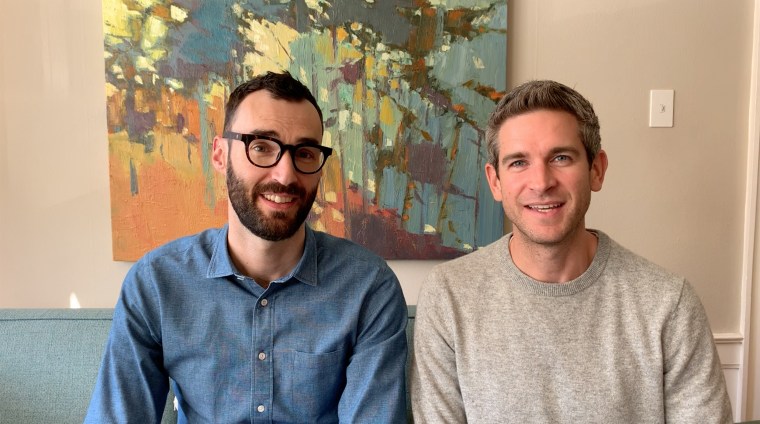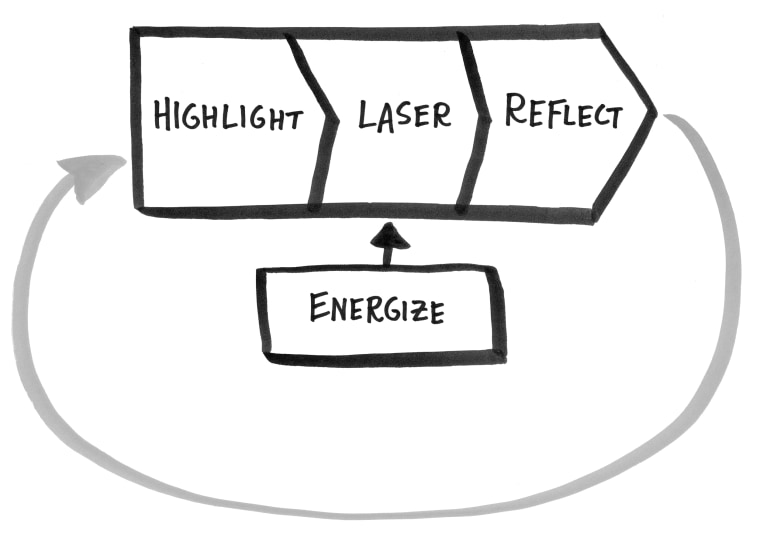In today’s busy world, making time for what matters can feel like one more impossible item on our to-do list. But according to productivity experts John Zeratsky and Jake Knapp, it doesn’t have to be.
The co-authors say their new book “Make Time: How to Focus on What Matters Every Day” outlines how we can overcome the many obstacles that prevent us from doing the things we really need to focus on.
“It’s all about concrete ways to rethink some of the default behaviors that have crept into 21st century life that have to do with our smart phones and our calendars and our corporate cultures that leave us with this feeling that time is sort of slipping away from us,” Zeratsky tells NBC News BETTER.
“I think one of the biggest themes of the book is that there’s a default in our culture, in our work culture, and our every day society of guilt,” adds Knapp “… a lot of the tools that are out there are just designed to nag us — to make us feel more guilty.”

The old coworkers used to work at GV, formerly Google Ventures. There, the men contrived a number of techniques to help startup companies be more productive, which they outlined in their first book “Sprint: How to Solve Big Problems and Test Ideas in Just Five Days.”
The duo say “Make Time” applies a lot of the same tactics for individuals. They say the book outlines four basic steps that, if repeated every day, can boost your productivity dramatically over time.
STEP 1: THE HIGHLIGHT
The first step is the most important, according to the authors. Each morning, figure out what you want to be the highlight of your day.
“Even if it’s just one thing, even if it’s something I’m doing already, what is the one thing I should have my peek attention on?” asks Zeratsky.
Everything else in your day is secondary to the highlight, Zeratsky says, which may require you to “bulldoze,” or clear your calendar so you can focus on that one thing.
“It has a powerful effect on what happens for folks,” Knapp says, “and it’s a nice, simple way to reframe everything, and it is kind of the heart of how ‘Make Time’ works.”
STEP #2: LASER
Now that you know what your highlight is, you need to be able to focus on it distraction free.
“The next thing after achieving that highlight, is the moment when you’re in it — that’s Laser,” says Zeratsky. “You want your attention to be laser-focused.”
Depending on what works best for you, this step could include eliminating or logging out of distracting apps on your phone, or turning off the news.
What matters is that you are excited about whatever you’re working on, says Knapp.
“And that’s actually the biggest difference from the other ways we’ve heard people talk about time management or attention management,” he says, “is this idea of really being excited, and bringing joy and enthusiasm to that moment.”

STEP #3: ENERGIZE
Energy is “the battery pack that makes everything else run,” so it’s important to take care of your physical health, the authors say. Be sure to make time to exercise and eat well so your energy stays elevated throughout the day, says Knapp.
“We just think it’s important to also keep in mind that the body is whole thing, it’s not just the brain,” he says.
Energy is “the battery pack that makes everything else run,” so it’s important to take care of your physical health.
Zeratsky adds, “It’s important we think to acknowledge that so much of what makes this thing possible — actually being able to experience that moment in your day and turn it into a highlight — is whether you have the physical and mental energy to give to it.”
STEP #4: REFLECT
Your day is over. Now it’s time to reflect on what you’ve accomplished.
“This is a really important part of what we put together,” says Zeratsky, “because we think that if people can take a little bit of time every day to reflect on the day, on what went well, what they wanted to make time for, whether that worked, whether they had the time, and then to make some tweaks and try it again differently the next day, they can start to set up a really healthy process and cycle of getting better and better about how they spend their time over time.”
Making time for what’s important isn’t simply about achieving results, says Knapp — it’s about how you feel as a result.
“Do I feel satisfied?” he asks. “Do I feel like even maybe a sense of relief, because that was something urgent, and I took care of it? — I didn’t put it off for another day. Or in the best of cases, do I feel a sense of joy that that was really a wonderful thing?”
The process isn’t about achieving a dramatic, overnight transformation, Zeratsky explains. “It’s really about getting into this day-to-day cycle of identifying a priority, making time for it, and then reflecting on how it went,” he says.
MORE TIPS FOR A BETTER DAY
- 9 things to do this morning to make your whole day more productive
- 12 tips to master your kids' morning routine and eliminate stress
- The productivity hack that allowed me to accomplish more in less time
- 15 protein-packed breakfasts that can help curb cravings
Want more tips like these? NBC News BETTER is obsessed with finding easier, healthier and smarter ways to live. Sign up for our newsletter and follow us on Facebook, Twitter and Instagram.


